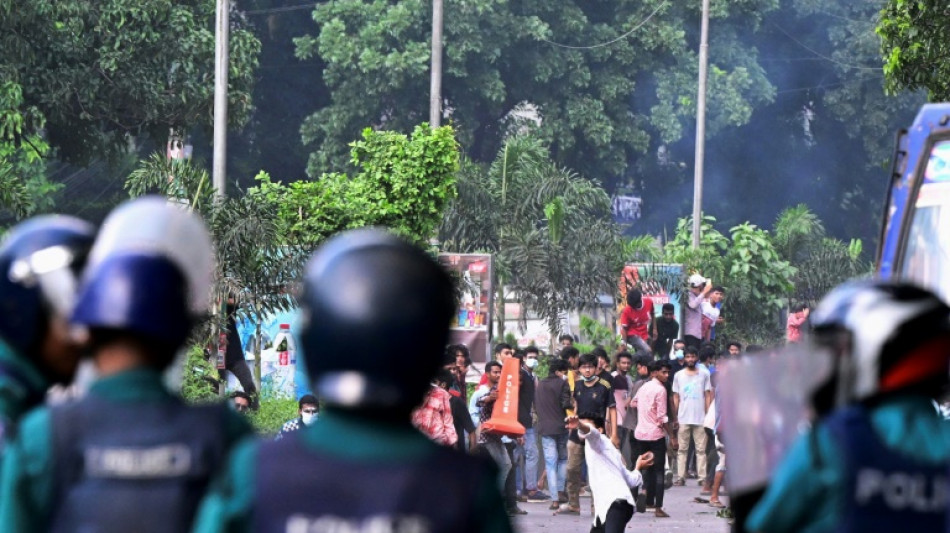
RBGPF
0.1600


When millions of Bangladeshis came back online this week after a nationwide internet shutdown, many were shocked to watch a ferocious police clampdown they had earlier only heard while bunkered in their homes.
At least 206 people were killed last month during some of the worst unrest of Prime Minister Sheikh Hasina's tenure, sparked by student demonstrations against civil service hiring rules.
Bystanders and several police officers were among the dead but most were protesters killed by police fire, hospitals told AFP, with rights groups and the European Union condemning what they said was an excessive use of force.
Footage of clashes between security forces and crowds was largely absent from news broadcasts and few had a grasp of their extent until the national mobile internet network was switched back on after an 11-day shutdown.
Though the unrest has since calmed, several graphic amateur videos published to social media that show police firing on protesters have inflamed public anger against Hasina's government.
"How come the police are killing our brothers and sisters like this?" one user wrote, in response to a short clip of a police officer firing at a wounded young man while another tried to drag him safely from the scene.
- 'I cried countless times' -
AFP was able to pinpoint the footage to Jatrabari, a bustling neighbourhood in the capital Dhaka, and from there identify three eyewitnesses who corroborated the video.
All spoke on condition of anonymity, fearing retribution if they identified themselves.
The incident occurred on July 20, hours after Hasina's government announced a nationwide curfew and deployed troops to restore order at the height of the unrest.
One witness said the wounded man in the video, 18-year-old Imam Hossain Taim, had been accosted by police but denied participating in protests before he was shot.
"He fell on the ground and was trying to crawl away. Two other men fled the scene but one guy came back to take his friend away," the witness added.
Taim was brought to Dhaka Medical College Hospital but died of his injuries later that day, his father Moynal Hossain told AFP.
"He was not even a protester," Taim's elder brother Tuhin told AFP. "He was roaming around with friends during a break in the curfew."
The footage of the attack on Taim was viewed more than half a million times after it was posted to Facebook, and the 60-second clip was widely shared on WhatsApp and other messaging platforms.
AFP also verified another video taken a day earlier in the nearby neighbourhood of Rampura that showed police firing at a man at point-blank range as he clung to an under-construction building. The man had fled into the site, according to eyewitnesses. The clip has been viewed more than two million times on Facebook.
"I cried countless times watching this. I am crying now," one user wrote in response. "This would not happen in a free country."
- 'Forced to open fire' -
Rights groups have accused Hasina's government of sidelining opposition parties and ruthlessly stamping out dissent during its 15-year tenure.
Bangladesh ranks 165 out of 180 countries on Reporters Without Borders' press freedom index, below Russia and just above Saudi Arabia.
Many in Dhaka could hear gunfire and explosions from around the megacity of 20 million people from inside their homes during last month's unrest.
But television coverage was heavily censored and showed little of the police response to the disorder, instead focusing on arson attacks and vandalism by protesters.
Amnesty International said its review of photographic, video and eyewitness testimony found the "unlawful" use of force by police against protesters on several occasions.
European Union foreign policy chief Josep Borrell also condemned the police response to the disorder and called for perpetrators to be brought to justice.
"There must be full accountability for the numerous instances of use of excessive and lethal force by the law enforcement authorities against protesters and others," he said in a statement.
Home Minister Asaduzzaman Khan last weekend denied that the police response to the unrest was excessive, saying security forces had shown "extreme levels of patience" and only fired when necessary to stop attacks on government buildings.
"When they saw that the properties could not be protected, then police were forced to open fire," he said.
T.Shimizu--JT